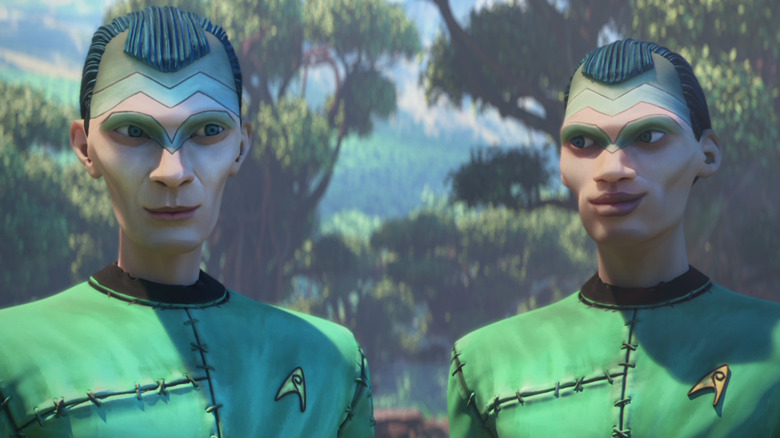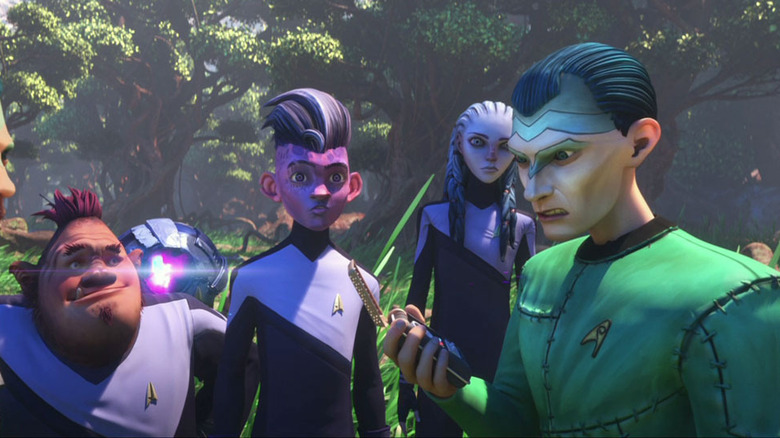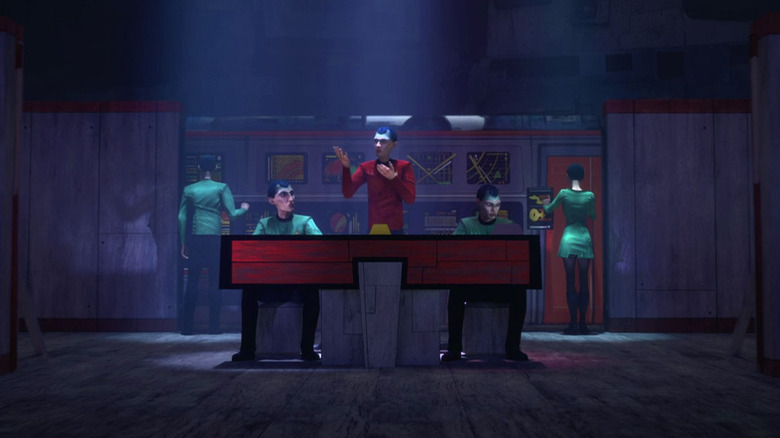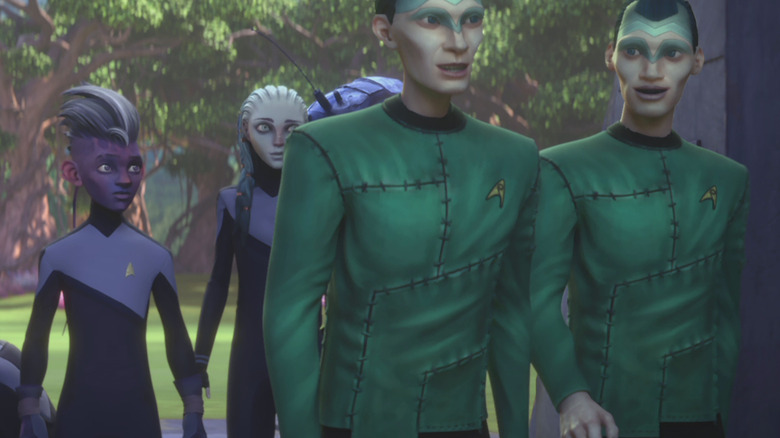An Unused Idea For Both Next Generation And Deep Space Nine Accidentally Made It Into Star Trek: Prodigy
The latest episode of "Star Trek: Prodigy," "All the World's a Stage," finds the teen crew of the U.S.S. Protostar encountering a distant planet occupied by a species called Enda-Prizians who speak in a formal Starfleet-like language and wear Starfleet-adjacent clothing. The Protostar crew soon come to the conclusion that this planet had been visited by Starfleet over a century ago, and the society adopted the organization's trappings as the basis of their society. They worship "Star Flight" and re-enact old ships' logs on a wooden stage, living "Star Trek" as their central cultural myth. "Enda-Prizian" is, of course, meant to sound like "Enterprise." They speak of a time when Star Flight will return and slay a monster that shares their planet.
This is clever on several levels. Firstly, "All the World's a Stage" could be seen as a comment on modern fandom. The Enda-Prizians have internalized "Star Trek" and made it the centerpiece of their zeitgeist ... but they have also gotten a lot of the details wrong. It's possible the makers of "Prodigy" were addressing a small group of Trekkies who misunderstand the show's overall themes of pacifism and inclusivity.
Secondly, "All the World's a Stage" is tapping into several classic "Star Trek" episodes about alien species receiving a small remnant of Earth culture and basing their entire society around it. In the original series, "A Piece of the Action" saw a planet inspired by literature about Prohibition-era gangsters, and in "Patterns of Force," a Starfleet representative with a distressing admiration of the Nazi party constructed a Nazi society in a developing alien world. In the "Next Generation" episode "The Royale," unseen all-powerful aliens reconstructed a trashy 20th-century Earth crime novel on their world.
The world of imitators
"Star Trek" has often revisited the trope of alien imitators; an alien species that is particularly impressionable, and who will happily take on the language and mannerisms of any visitor. Such species are convenient for telling stories about the Prime Directive. It's important to not interfere, as one can easily reshape a planet's natural development.
"All the World's a Stage" was written by Aaron J. Waltke, and in a recent interview with TrekMovie, he talked about the genesis of the episode, and how it was actually derived from an idea that had been floating around "Star Trek" writers rooms since the 1990s. Waltke remembers the brainstorming process, saying:
"[For] this particular [idea], I have to give credit to Diandra Pendleton-Thompson. She came in with the idea and said, 'All the world's a stage.' And immediately I was like, 'That sounds like an Original Series episode idea.' And then she said, 'What if we came down to a planet where everybody was reenacting captain's logs?' And I was like, 'Well, how would that work?' Would it be like old transmissions? And then it slowly got our gears turning realizing like, what if it was a matter of cultural contamination?"
Once the "cultural contamination" idea was struck upon, it was off to the races. Waltke, well-versed in "Trek" lore, immediately began making the natural comparisons to classic "Trek" episodes. He thought that "maybe there was an old TOS-era character who — similar to 'A Piece of the Action' — had contaminated and created this whole world that then became sort of this odd sort of copy of a copy of Starfleet."
Alien imitators had previously come to mirror '20s gangsters. Why not Starfleet as well?
The 30th anniversary episode
It wasn't until after Waltke had written "All the World's a Stage" that he learned it had matched an idea that had once been pitched by Michael Piller, the longtime "Star Trek" executive producer who passed away in 2005. Piller, it seems, looked to a known "planet of imitators" in "Trek," the species from "A Piece of the Action," and posited a follow-up story where Kirk — after having undone the cultural damage left behind by gangland history — would have left just as strong a cultural impact. 80-some years later, the imitators would be, perhaps logically, imitating Starfleet now.
Piller's "A Piece of the Action" sequel was going to be an episode of "Star Trek: Deep Space Nine," and would coincide with the 30th anniversary of the original series. The idea of sequelizing an Original Series episode, though, eventually transformed into an episode called "Trials and Tribble-ations," which saw the DS9 crew placed digitally into scenes from the episode "The Trouble with Tribbles." Waltke saw the similarities between Piller's idea and his, but acknowledged that it was a complete coincidence:
"Believe it or not, that was a completely happy accident. And I just felt validated that it's a good idea, because I suppose weird minds think alike. But that tends to be our process on 'Prodigy.' We both think in terms of a wish list of just fun and interesting ideas. And then we think about our bills to pay emotionally and character-wise."
Attending a Trek convention inside Star Trek
The idea of a "fake Starfleet" also reflected on the "Prodigy" characters, who wear Starfleet cadet uniforms, but who weren't even aware of the existence of the Federation until recently. They, too, are still aspirational outsiders. As Waltke pointed out:
"And in this case, the 'Prodigy' crew sort of coming off the heels of the revelation that they can't go back to Starfleet right away, but can they still do good? And what does that make them? Are they Starfleet? Are they not? And then that overlapping perfectly with the society where everyone seems to believe they're Starfleet and it felt like a story we couldn't pass up."
Back in 2018, TrekMovie had also gone into further detail about the follow-up to "A Piece of the Action." That episode, the website revealed, provided a handy opening to a sequel, as Dr. McCoy (DeForest Kelley) would have left one of his communicators behind on the gangster world, henceforth offering further tainting of their culture. Piller's original idea would also have required a cameo from Leonard Nimoy, reprising the role of Spock, to come in and work things out.
According to TrekMovie, one of the franchise's head honchos, Ron D. Moore, liked the idea for its meta-commentary potential. Moore even pitched the idea of aliens attending a "Star Trek" convention.
Incidentally, a story about a space alien kidnapping "Star Trek" figures and forcing them to attend an eternal off-world "Star Trek" convention was used in a 2002 episode of "Futurama" called "Where No Fan Has Gone Before." That episode saw the reunion of the original cast, sans Kelley who had already died, and James Doohan who merely refused.



